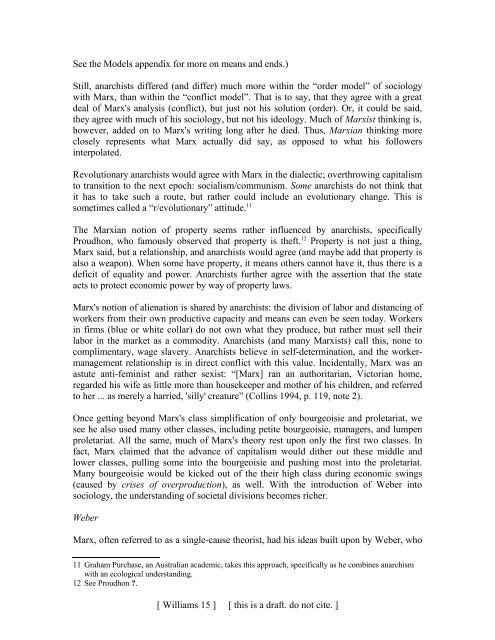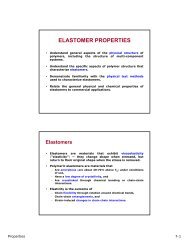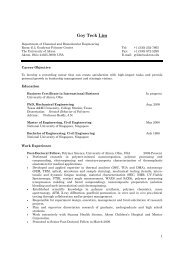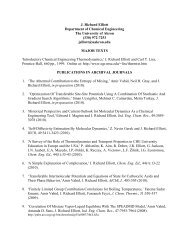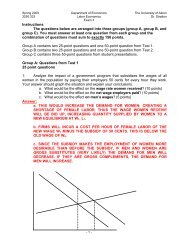Sociology of the Anarchists - Gozips.uakron.edu - The University of ...
Sociology of the Anarchists - Gozips.uakron.edu - The University of ...
Sociology of the Anarchists - Gozips.uakron.edu - The University of ...
Create successful ePaper yourself
Turn your PDF publications into a flip-book with our unique Google optimized e-Paper software.
See <strong>the</strong> Models appendix for more on means and ends.)<br />
Still, anarchists differed (and differ) much more within <strong>the</strong> “order model” <strong>of</strong> sociology<br />
with Marx, than within <strong>the</strong> “conflict model”. That is to say, that <strong>the</strong>y agree with a great<br />
deal <strong>of</strong> Marx's analysis (conflict), but just not his solution (order). Or, it could be said,<br />
<strong>the</strong>y agree with much <strong>of</strong> his sociology, but not his ideology. Much <strong>of</strong> Marxist thinking is,<br />
however, added on to Marx's writing long after he died. Thus, Marxian thinking more<br />
closely represents what Marx actually did say, as opposed to what his followers<br />
interpolated.<br />
Revolutionary anarchists would agree with Marx in <strong>the</strong> dialectic; overthrowing capitalism<br />
to transition to <strong>the</strong> next epoch: socialism/communism. Some anarchists do not think that<br />
it has to take such a route, but ra<strong>the</strong>r could include an evolutionary change. This is<br />
sometimes called a “r/evolutionary” attitude. 11<br />
<strong>The</strong> Marxian notion <strong>of</strong> property seems ra<strong>the</strong>r influenced by anarchists, specifically<br />
Proudhon, who famously observed that property is <strong>the</strong>ft. 12 Property is not just a thing,<br />
Marx said, but a relationship, and anarchists would agree (and maybe add that property is<br />
also a weapon). When some have property, it means o<strong>the</strong>rs cannot have it, thus <strong>the</strong>re is a<br />
deficit <strong>of</strong> equality and power. <strong>Anarchists</strong> fur<strong>the</strong>r agree with <strong>the</strong> assertion that <strong>the</strong> state<br />
acts to protect economic power by way <strong>of</strong> property laws.<br />
Marx's notion <strong>of</strong> alienation is shared by anarchists: <strong>the</strong> division <strong>of</strong> labor and distancing <strong>of</strong><br />
workers from <strong>the</strong>ir own productive capacity and means can even be seen today. Workers<br />
in firms (blue or white collar) do not own what <strong>the</strong>y produce, but ra<strong>the</strong>r must sell <strong>the</strong>ir<br />
labor in <strong>the</strong> market as a commodity. <strong>Anarchists</strong> (and many Marxists) call this, none to<br />
complimentary, wage slavery. <strong>Anarchists</strong> believe in self-determination, and <strong>the</strong> workermanagement<br />
relationship is in direct conflict with this value. Incidentally, Marx was an<br />
astute anti-feminist and ra<strong>the</strong>r sexist: “[Marx] ran an authoritarian, Victorian home,<br />
regarded his wife as little more than housekeeper and mo<strong>the</strong>r <strong>of</strong> his children, and referred<br />
to her ... as merely a harried, 'silly' creature” (Collins 1994, p. 119, note 2).<br />
Once getting beyond Marx's class simplification <strong>of</strong> only bourgeoisie and proletariat, we<br />
see he also used many o<strong>the</strong>r classes, including petite bourgeoisie, managers, and lumpen<br />
proletariat. All <strong>the</strong> same, much <strong>of</strong> Marx's <strong>the</strong>ory rest upon only <strong>the</strong> first two classes. In<br />
fact, Marx claimed that <strong>the</strong> advance <strong>of</strong> capitalism would di<strong>the</strong>r out <strong>the</strong>se middle and<br />
lower classes, pulling some into <strong>the</strong> bourgeoisie and pushing most into <strong>the</strong> proletariat.<br />
Many bourgeoisie would be kicked out <strong>of</strong> <strong>the</strong> <strong>the</strong>ir high class during economic swings<br />
(caused by crises <strong>of</strong> overproduction), as well. With <strong>the</strong> introduction <strong>of</strong> Weber into<br />
sociology, <strong>the</strong> understanding <strong>of</strong> societal divisions becomes richer.<br />
Weber<br />
Marx, <strong>of</strong>ten referred to as a single-cause <strong>the</strong>orist, had his ideas built upon by Weber, who<br />
11 Graham Purchase, an Australian academic, takes this approach, specifically as he combines anarchism<br />
with an ecological understanding.<br />
12 See Proudhon ?.<br />
[ Williams 15 ] [ this is a draft. do not cite. ]


